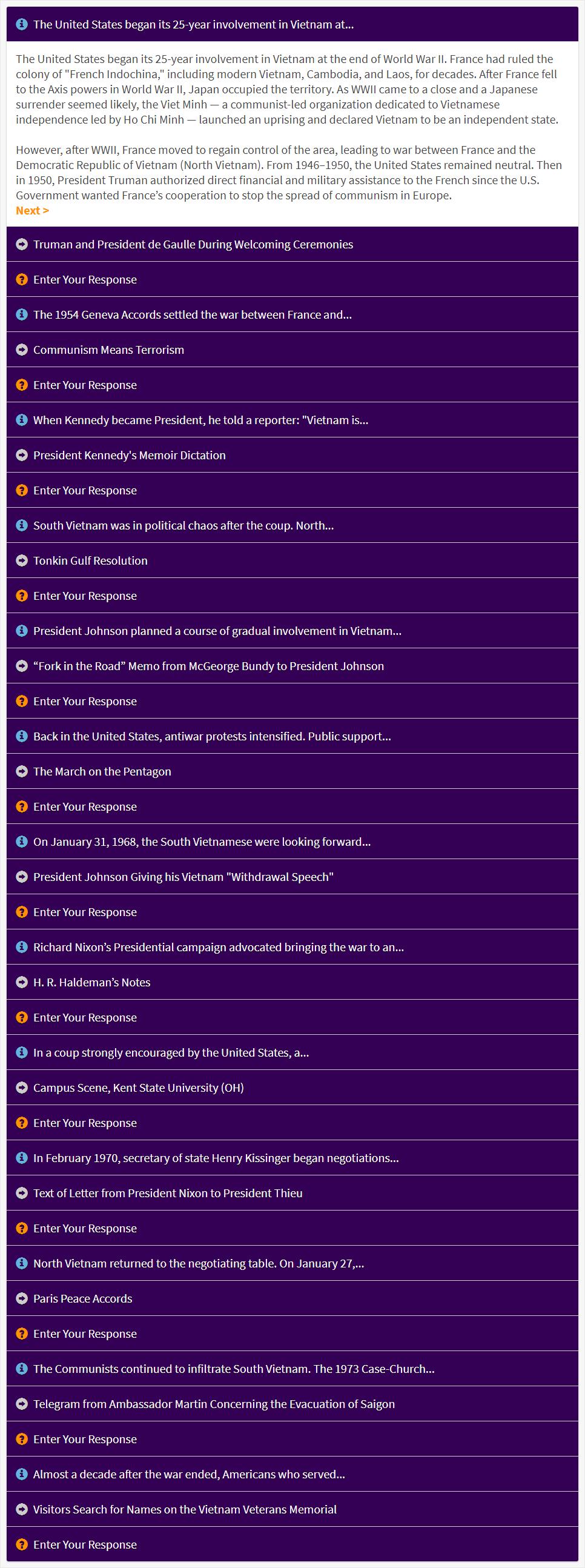In this activity, students will look at U.S. involvement in Vietnam through the lens of U.S. Government policy. Students will give titles to "episodes" of the Vietnam War to effectively create a sequence of events covering U.S. involvement in Vietnam – from President Truman's support for France after WWII to the normalization of relations between the United States and Vietnam in 1995.
Students will analyze primary sources and read background information to understand the episodes, then reflect on why the United States was involved in the war and how it might have happened differently.
Suggested Teaching Instructions
Use this activity while teaching the Vietnam War or during a unit on the Cold War. It is helpful if students are informed about the perceived threat of communism during the Cold War and the U.S. Government's stance on it.
For grades 9-12; this activity can be done in class in small groups, or individually outside of class. Approximate time needed is 60-90 minutes. Due to the length, you may wish to break it up into multiple class periods or assignments.
You may wish to show students the short video "
The Wars in Vietnam" (on YouTube), created for the
Remembering Vietnam exhibition at the National Archives. The video provides students with an overview of the Vietnam War from French colonialism to the Fall of Saigon. It would be appropriate either before or after the activity. You may also wish to share this
quick reference guide (PDF) for students to have on hand as they work.
Begin the activity by asking students to recall the premise of the Cold War. It is important that they understand the U.S. Government's policy of containment and determination to stop communism from spreading.
Direct students to open the activity and read the background information provided in the introduction:
During the Cold War, the U.S. Government feared that communism would spread and threaten democracy around the world. In Vietnam, the United States committed to battling communism financially at first, by supporting South Vietnam – who fought for Vietnam to be aligned with western allies like the United States. North Vietnam and the Communist organization in South Vietnam, the People's Liberation Armed Forces, fought for Vietnam to be a Communist state. Americans and their South Vietnamese allies referred to the People's Liberation Armed Forces as "insurgents" or "Viet Cong." U.S. military advisers were sent to Vietnam to train and support South Vietnamese troops. Eventually, as an ally to South Vietnam, the United States put troops on the ground to fight against North Vietnam and the People's Liberation Armed Forces.
Next, per the instructions in the activity, students should examine each episode — each one includes an information box to read and a primary source document to analyze. Inform students that they must click “View Document Details” to read the full documents and their descriptions (and to listen to JFK's audio memoir dictation). After examining each episode, they should give it a title in the "Enter Your Response" box that follows each document. An example is provided.
Students may come up with episode titles such as:
- Truman Supports France Against North Vietnam
- Eisenhower Supports Diem in South Vietnam
- Kennedy Sends Military Advisers
- Congress Passes the Tonkin Gulf Resolution
- Johnson Orders Airstrikes and Sends Ground Troops
- Americans Protest the War
- The Tet Offensive Surprises America
- Nixon Obstructs Peace Talks and Pushes Vietnamization
- Nixon Targets Cambodia and Students Protest
- Nixon Tries to Force Negotiations
- The Paris Peace Accords Officially End the War
- North Vietnamese Communists Conquer Saigon
- The Vietnam Veterans Memorial is Created and U.S.-Vietnam Relations are Normalized
Once students have written all of their titles, they should click "When You're Done." Point out to students that they have effectively created a sequence of events covering U.S. involvement in Vietnam.
They will be instructed to answer the following questions:
- Why was America involved in the Vietnam War?
- Why do you think the Vietnam War was so divisive for America?
- Did you expect the war to end earlier than it did? If so, after what episode and why didn't it?
- If you were the U.S. President, would you have done things differently?
Follow up with a class discussion of the questions. Remind students that this is a simplification of a complex topic. Ask them whose perspectives are missing from this narrative and what other kinds of information they might need to better understand the Vietnam War as a whole.





